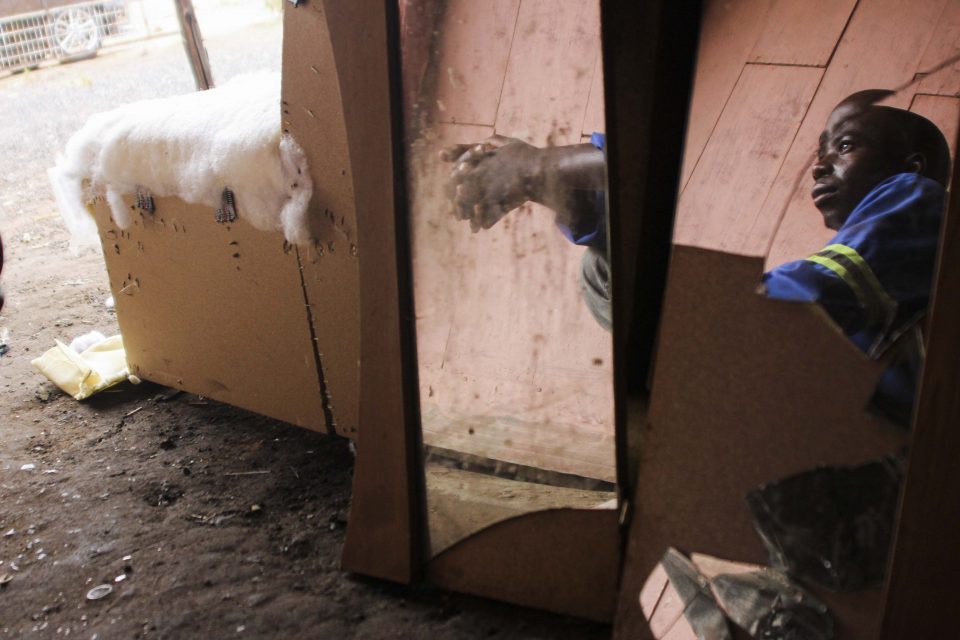The artisans hunting for work on the streets
Skilled workers line the streets in towns and cities across the country, hoping to get any job they can. But the odds of being picked are small, and some spend weeks waiting.
Author:
12 April 2021

“Since the morning, I haven’t eaten. We’ve been sitting in the street looking for a job. I’ve been looking for a job for the whole week and there is nothing,” says Derrick Maseko, 34. Since the beginning of March, he has been coming to Church Street in Bronkhorstspruit, Gauteng, hoping to get a job.
Maseko lives in Dunusa, a shack settlement adjacent to Zithobeni township. He walks almost 5km to Church Street, where hopeful artisans sit till noon sometimes, waiting for someone to offer them work.
Maseko learned construction in 2008 and specialises in building, plastering, paving, tiling and putting in ceilings. “My hands convert a plain plot into a beautiful home,” he says. Originally from KaNyamazane, a township 30km from Mbombela in Mpumalanga, Maseko left his wife and two children, aged 13 and nine, to find work.
Related article:
He used to be employed as a subcontracted builder for one of the mines in Mpumalanga’s highveld. “I used to earn R3 000 per fortnight … We stopped working … because the owners of the mine would hire a person and then fire that person without giving any solid reason. People noticed that they were exploited and decided to report the mine to the government,” he says. Investigations began at the beginning of March, and the mine asked him to stop working until further notice.
Now Maseko joins the country’s millions of unemployed people as he takes whatever piece jobs he can find on the street. Statistics South Africa’s fourth quarter labour force survey for 2020 showed the number of unemployed people rose by 701 000, and now stands at 7.2 million. This means unemployment rose by 1.7 percentage points to 32.5% – the highest since the start of the surveys in 2008. By the expanded definition, the unemployment rate stands at 42.6%.
A skilled builder
I ask Maseko if he can show me any structures he has built. He smiles and says, “I have so much confidence in my work.”
The closest building he has worked on is in Balmoral, a town in the Emalahleni Local Municipality, 25km from Bronkhorstspruit. About 200m off the tar road, inside a plot with a well-maintained garden, stands a marvellous brick house. Maseko explains to the caretaker why we are visiting and asks where the owner is. He’s not around, but we are allowed to look at the structure.
The house still needs to be completed, but the neatness of the finishes stands out. “We left this house in December. We built this from scratch. And actually, you haven’t seen much. This is just an introduction,” he says. “I’ve done so much work. There’s another one I’ve built. It is a restaurant.” He adds that it often serves rich customers.
Maseko takes a great deal of pride in his skill. “I did not want to deceive you about my work. I wanted you to see for yourself. With me, when I go to market for a job, I do not market carrying building tools. I tell you straight that I do this and that and I will do some sample work for you. If you are pleased then we can continue with the job. However, some of the people misjudge my building skills.”

The time is 10:35am. Since Maseko has not had anything to eat, why not dine in the restaurant he built? “Are you serious that we are going inside to eat? To tell you the truth, even now I am in disbelief that we are actually going to eat inside the restaurant.” He seems nervous. “My friends, especially those I’ve worked with to build the restaurant, will never believe that I’ve come inside to eat breakfast here. It is the first time entering here in such a capacity. I was only here to build the structure.”
It is noticeably cooler when we step inside. Pop rock plays in the background. We order a healthy breakfast, which consists of raspberries, strawberries, kiwi fruit, plain yoghurt and muesli.
Maseko knows everything about the restaurant and explains that the floor was finished at midnight. “This restaurant took us the whole year to build. I am the one who made the floor, but the roofing was done by my other guy,” he says.

Longing for work and for home
Back on the street, Maseko joins the dozens of men who gather every day to look for any work they can get. When a car stops, they all run to it, desperately hoping they will be chosen.
Robert Salos, 27, is from Blantyre in the Shire Highlands of southern Malawi. He came to South Africa to find work. Salos left behind his wife and seven-year-old daughter. “I don’t like hard jobs, but because it is difficult to get a job, we accept anything,” he says.
He also lives at the Dunusa shack settlement, where he pays R350 rent. The longest period he has been employed is two months when he worked for a guest house in the middle of last year. They paid him R150 a day. “Now I work and stop,” he says. “My life is too difficult, especially since … lockdown. Sometimes the whole week I am working on piece jobs and sometimes for two weeks I am not working. I just go to town to market and hope to get something. Like today, I am going to town and coming with nothing.”
Salos has not been home for a long time. He says, “Maybe this year I must go back, because now it is two years that I have not seen my family. I miss my family so much.”
Related article:
When he gets enough work, Salos tries to send some money home for his wife and daughter. “If I am working two weeks, I help my family but if I am not working, there is nothing I can do. At least I try to send R1 500, but it is sometimes, not always. I have been working … piece jobs for the past two years,” he says.
When things get harder, a part of him wants to return. But there is a problem. “I need a lot of money, which is R5 000 to get home nicely. I thought that maybe in South Africa I can make enough money. Sometimes South Africa looks like a good place, especially when you have money, but when you don’t, it is hard.”
Cheated out of pay
Promise Prosper Muronde, 27, from Zimbabwe, has not had a full-time job since 2016. “I do a lot of things, but in construction, I know painting and paving,” he says. When asked how he survives when he gets no income at all, he says: “It is only God, man, who makes me survive. He provides everything for me. Sometimes I can even work five days in a month. Sometimes I can work a week or two. It depends.”

These builders do not sign any formal contracts or agreements when they get a job. “Some people rob us. I was robbed many times. They’d let me work and never pay me, especially in construction. They usually rob us. It is really not good,” he says.
Despite this, these men keep job hunting. “Life is extremely tough to tell you the truth,” says general worker and painter Sabini Matjeke, 35, a father of three from Mozambique, who also tries to find work on the street. “Whenever you get picked for a piece job, it is by luck, given that there are a lot of us here who come to market for jobs.”


